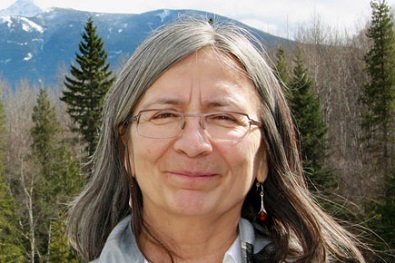Val Napoleon, University of Victoria’s Indigenous Law Research Unit director. Photo Courtesy newsroom.carleton.ca
A well-researched Aboriginal justice professor is dubious that Canadian courts offer long-term solutions to First Nations disputes.
This comes after urban member for Peter Ballantyne Cree Nation Brian McKay expressed concerns about Warren McCallum taking PBCN’s Elder’s Council to federal court over their late 2015 decision to remove McCallum from his position. The Elder’s Council decision was based on a petition signed by hundreds of people citing concerns with McCallum’s leadership.
In court, both PBCN and McCallum’s legal counsel agreed the federal court has jurisdiction in this matter.
Currently, membership is awaiting a written decision from Federal Court Justice St-Louis.
McKay said he’s concerned about the message this court action is sending.
“At the end of the day, that is going to be saying white man dictating how we run our band business,” he said.
The PBCN case is not the first time an Elder’s Council has been taken to court in Canada. This and other cases stand as examples of societies that once operated under complex Cree legal systems, now drawing on the Canadian legal system to manage conflict in modern times.
The University of Victoria’s Indigenous Law Research Unit (ILRU) director Val Napoleon has concerns about that.
“There is a level of conflict in Indigenous communities and one of the causes for conflict is the undermining of people’s own law and legal processes which were formerly ways that they managed themselves,” she said.
Napoleon says historically, the courts don’t recognize the jurisdiction of Cree law and the court’s ruling may not give the stability that’s being sought.
“The sad reality is that over the long term that kind of sustained or continuing conflict can undermine a community’s morale and sense of their own capacity.”
McKay and urban Elder Eli Natewayes have a number of other concerns about McCallum, the petition and affidavits that were presented at federal court.
The legal issues of First Nations communities across Canada are “overwhelming,” making it difficult for current First Nations legal systems to deal with, Napoleon said. However, she said going to federal court is just as difficult as working within Cree law.
McKay is wondering why the McCallum dispute when to court in the first play, saying he views the Elders Council’s word as law.
“It’s unwritten law within old band traditions and customs. Whenever anything is taken to an Elder’s Council, usually those wishes, or judgments, or advice, or opinions, are followed,” he said.
Napoleon said her research does show that Elders were traditionally considered authoritative decision-makers, but it also shows three other groups as decision-makers: leaders, the entire community, and medicine people.
This means she’s saying there is space in Cree systems to question Elders decisions.
“The problem with saying you can’t ever disagree with something like an Elders Council suggests that there’s no agency on the part of anyone else, that there’s no free will on the part of anybody else in the community and we know from our histories that that’s not the case,” she said.
What matters the most is that human dignity is respected and that there is human agency.
Traditional Cree legal systems that once functioned for whole societies have been fractured by the Indian Act and other symbols of Canadian colonialism, Napoleon said.
Now, First Nations are tasked with finding out their people’s values and coming up with legal and intellectual resources to “reason through a way to solve the problem” when their laws are broken or when disputes arise, she said.
With the ILRU, Napoleon has forged connections with 40 different First Nations to work on implementing their own laws to run alongside the Canadian system.
